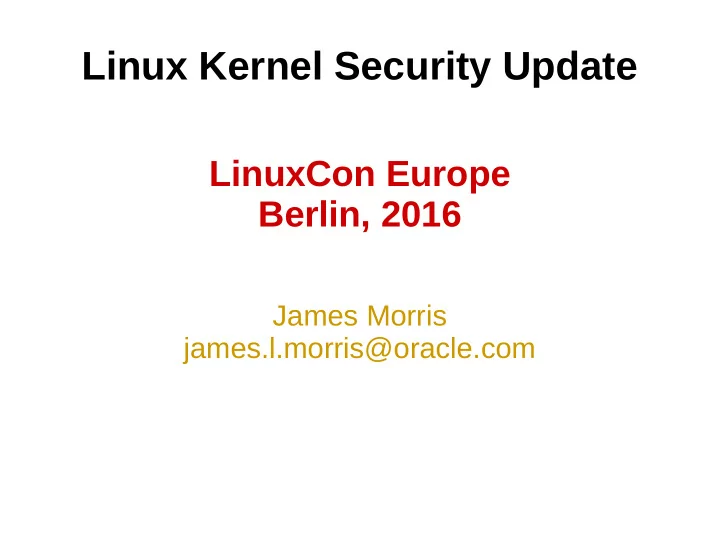

Linux Kernel Security Update LinuxCon Europe Berlin, 2016 James Morris james.l.morris@oracle.com
Introduction Who am I? ● Kernel security subsystem maintainer – Started kernel development w/ FreeS/WAN in 1999 – which led to Netfilter, SELinux, LSM, Crypto… – @xjamesmorris ● Linux since 1993 – APANA public networking – BBS’s prior to that – Amateur radio (vk2txp) ● Mainline Linux kernel development @ Oracle
Outline ● Overview of Linux kernel security ● Developments in 4.x kernel ● Current and future challenges
Linux Kernel Security Overview
Linux kernel core security model is Discretionary Access Control (DAC)
DAC was inherited from Unix, designed in late 1960s
“The first fact to face is that UNIX was not developed with security, in any realistic sense, in mind; this fact alone guarantees a vast number of holes .” Dennis Ritchie, “On the Security of UNIX”, 1979
DAC is insuffjcient for modern security threats:
DAC does not protect against fmawed or malicious code
DAC does not cover all security critical functions
DAC notion of superuser violates user security policy
“It must be recognized that the mere notion of a super-user is a theoretical, and usually practical, blemish on any protection scheme.” (also from Ritchie 1979)
Linux Kernel Security Extensions
Posix ACLs
Capabilities (privileges)
Audit
seccomp
Namespaces
Netfilter ● IPTables
Cryptography API ● Disk encryption ● IPSec ● Key Management (“keys”)
Linux Security Modules (LSM) ● SELinux ● Smack ● AppArmor
SELinux, Smack, AppArmor provide Mandatory Access Control (MAC)
Platform Security ● TPM, NX, SMEP, SGX, TrustZone etc.
Kernel Self Protection (KSP):
Harden kernel against attack
Kill classes of bugs vs. individual bugs
Kernel Self Protection Project:
Current focus is upstreaming grsec/pax features
Website: https://kernsec.org/wiki/index.php/Kernel_Self_Protection_Project
Recent Changes
● Linux v4.0 (April 2015) to v4.8 (current)
Capabilities ● Ambient capabilities (v4.3) – Allows inheritance of capabilities from non-privileged parent processes. ● … instead of assigning fs capabilities to binary, which will always run with them. ● Do not need to give all capabilities to script interpreters.
LSM API ● Generalized security module stacking (v4.2) – Simple manual stacking previously allowed – Now: any number of smaller LSMs can be stacked on top of a major (“monolithic”) LSM – e.g. SELinux + YAMA + Capabilities, but not SELinux + TOMOYO + AppArmor. ● New LoadPin module, ensures kernel modules & fimware are loaded from trusted device (dm-verity) (v4.7)
Networking ● CALIPSO IPv6 Labeling (v4.8) – RFC 5570 – Security labels in IP option – IPv6 version of CIPSO – Usable by label MAC (SELinux, Smack) – Verified interop with Solaris TX
AppArmor ● Kernel work focused on AA 3.0 cycle ● Upcoming (v4.10-v4.11) – Policy namespaces – Policy stacking – Integration with containers
SELinux ● Android Binder IPC support (v4.0) ● Full Netlink coverage (v4.1) ● Performance improvements (v4.1) ● Fine grained ioctl coverage (v4.3) ● Export validatetrans decisions to userspace (v4.6) ● Restrict kernel module loading (v4.7) ● CALIPSO support (v4.8) ● Upcoming: Overlayfs support (v4.9)
Smack ● Netfilter secmark support (v4.0) ● Allow unconfined label in bringup mode (v4.1) ● Obtain security context of keys (v4.1) ● Multiple label MAC bypass via onlycap (v4.2) ● IPv6 host labeling (v4.3) ● Limited dynamic process labels (v4.4) ● Process-based permission checking for sockets (v4.5)
Integrity Subsystem ● Integration of TPM 2.0 authorization policies with kernel keys, allow hash algorithm selection (v4.5) ● EVM support for x.509 kernel certificates (v4.5) ● Measurement & appraisal of IMA policy (v4.6) ● Support for kernexec image & initramfs (v4.6) ● Support for mknotat syscall (v4.7) ● Per-rule specification of PCRs (v4.8) ● Upcoming: extend measurment to command line, BPF etc., fine grained signatures, directory measurement, namespacing.
Platform Security ● TPM 2.0 chip support (v4.0) ● Intel Memory Protection Keys (v4.6) ● Upcoming: – Sparc: SSM (Silicon Secured Memory) – AMD: SME, SEV (memory encryption) – Intel: CET (Control-flow Enforcement Technology)
Audit ● Add support for auditing by executable fjle, rather than just PID (v4.3) ● Add ioctl device and command info to LSM audit data (v4.3) ● Add tty fjeld to Login event (v4.7)
Seccomp ● ptrace options for suspend/resume (v4.3) ● powerpc and tile support (v4.3) ● Dump seccomp filters via ptrace (v4.4) ● um and parisc support (v4.5) ● Remove 2-phase API (v4.8) ● ptrace before seccomp (v4.8) ● Maybe upcoming: deep argument inspection
Keys ● Support for kernel module signing (v4.3) – Explicit file for x.509 trusted keys – Sign modules with external key ● Support for TPM 2.0 (v4.5) ● Userspace access to DH computation using stored keys (v4.7) ● Encrypt big keys saved to shm (v4.7) ● Key blacklisting and rejection (v4.7) ● Runtime addition of secondary system key (v4.7) ● Upcoming: key revocation
Crypto API Users ● ext4 fjlesystem encryption (v4.1) ● Kernel module signing (v4.3) ● MACsec/IEEE 802.1AE (v4.6) ● Migrate ext4 to vfs crypto API (v4.8) ● Upcoming: btrfs encryption
Kernel Self Protection ● Kernel Address Sanitizer (KASan) (v4.0) – SLAB support (v4.6) ● Always enable RODATA checking (v4.6) ● KASLR for ARM64 (v4.6), MIPS (v4.7) ● Page zero-poisoning (v4.6) ● X86 execute-only memory (v4.6) ● SLAB freelist randomization (v4.7) ● BPF JIT constant blinding (v4.7)
KSP (cont.) ● Freelist randomization for SLUB (v4.8) ● KASLR: – Full physical memory on x86_64 (v4.8) – Kernel memory base on x86_64 (v4.8) ● gcc plugin infrastructure (v4.8) ● Hardened usercopy (v4.8)
KSP (cont.) ● Predictions for v4.9 from Kees Cook – latent_entropy gcc plugin – vmalloc stack on x86 – List hardening – PAN emulation for arm64 ● For more detail: – https://outflux.net/blog/ (Kees’ blog)
Future Challenges ● IoT ● KSP arms race – Need more original research in mainline! ● Evolving threat models ● Security architecture vs. features
Resources ● Linux Security Module mailing list – http://vger.kernel.org/vger-lists.html#linux-security-module ● Linux Security Summit (Aug 2016, Toronto) http://events.linuxfoundation.org/events/linux-security-summit/program/slides – ● Kernel Self Protection Project – http://kernsec.org/wiki/index.php/Kernel_Self_Protection_Project ● LWN Security – http://lwn.net/Security
Recommend
More recommend